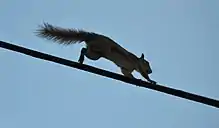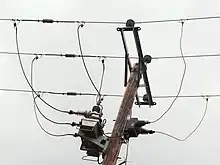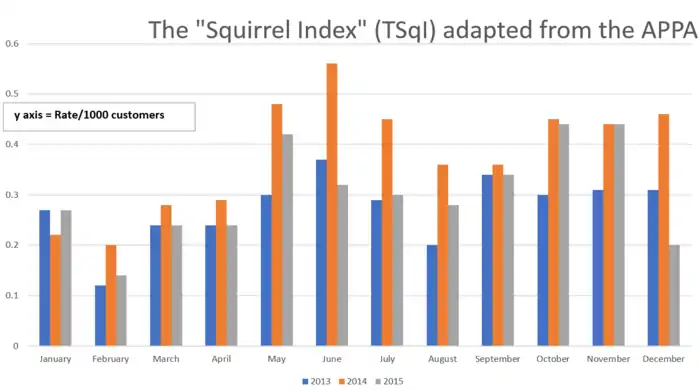Electrical disruptions caused by squirrels
Electrical disruptions caused by squirrels are common and widespread, and can involve the disruption of power grids. It has been hypothesized that the threat to the internet, infrastructure and services posed by squirrels may exceed that posed by terrorists.[1] Although many commentators have highlighted humorous aspects of the concern, squirrels have proven consistently able to cripple power grids in many countries,[2] and the danger posed to the electrical grid from squirrels is ongoing and significant[3][4] This has led to tabulations and maps compiled of the relevant data.[5]


Scope
Electrical disruptions caused by squirrels are common and widespread. Between Memorial Day and August 31, 2013, at least 50 power outages caused by squirrels (POCBS) were recorded in 24 U.S. states.[6] Cities affected by POCBS included Mason City, Iowa and Portland, Oregon.[7] Most media coverage of such events has compared the number of electrical grid shutdowns due to squirrels and those due to terrorists. Commentators often embellish and parody descriptions of the squirrels responsible for interrupting electrical service with allusions to military action or concerns, for example: "Squirrels mobilize, plot acts of cyber terrorism against humankind—And they're not acting alone."[8] or "Squirrelus interruptus: 5 things shut down by squirrels—How can a squirrel bring a nuclear weapons site to its knees?"[7] Electrical grids are not the only types of infrastructure at risk from squirrels, but nuclear weapons sites have also been described as targets of squirrel attention. Ground squirrels have interfered with underground nuclear missile sites at Malmstrom Air Force Base in Montana. The squirrels are able to tunnel under fences, bypassing motion detectors. Like their arboreal relatives, they can damage electrical cables by biting them. In addition, those that do take above-ground routes onto the base trigger thousands of false alarms each year.[7]
Prevention
Squirrels damage electrical distribution facilities by tunneling, by chewing through electrical insulation, or by simultaneously coming into contact with two conductors at different electrical potentials.[9][10] Typically the animal is killed by the passage of current through its body.[11] Prevention is complicated by the ability of squirrels to bypass plastic animal guards, gnaw through insulation and squeeze through small openings into substations.[12]
Metrics
Squirrel-caused grid disruption in the U.S. is monitored by the American Public Power Association (APPA).[12] The APPA has developed a data tracker called "The Squirrel Index" (TSqI) to analyze the pattern and timing of "squirrel attacks" on electrical power systems. The TSqI is a metric that quantifies the rate per 1,000 customers over a period of time, and indicates two peak periods of highest "squirrel activity" or "squirrel peaking months" (SqPMS) in the year, in May–June and October–November, when disruption is greatest.[13]

Analytics
Intentional damage by human terrorists is often the first concern in assessing threats to the U.S. power supply; some cybersecurity experts believe a country's infrastructure, such as its power grid, is a likely terrorist target. But according to the security researcher Cris Thomas, also known by the pseudonym SpaceRogue, "We've had power outages caused by squirrels in all 50 states ... [including] Hawaii, where they don't even have squirrels, but they do have chickens."[15][16]
Specific cases
In 1987 a 90-minute loss of power to Nasdaq's automated trading computer, caused by a squirrel, affected twenty million trades.[9][17][18] Nasdaq was shut down for about 30 minutes again in 2014 by a squirrel-induced power outage.[19][20][21] Other commentators have noted that actual cyber attacks by human terrorists are much rarer than disruption caused by squirrels.[14]
John C. Inglis, the former deputy director of the U.S. National Security Agency, said in 2015 that he judged the electrical grid was as likely to be paralyzed by a natural disaster as by a cyberattack and added: "[F]rankly, the No. 1 threat experienced to date by the U.S. electrical grid is squirrels."[22][23]
Similar concerns exist in Germany, where in 2005, a "cyber squirrel" crippled the entire electrical grid south of the River Elster for an hour. This squirrel was described as "a furry suicide bomber" ("pelzige[r] Selbstmordattentäter").[24]
Squirrels have been the cause of many power outages in Pennsylvania.[n 1] Cris Thomas has said that as of January 2017 in the United States there have been six deaths associated with squirrel interference with infrastructure, such as downed power lines (and two with other animals).[18][43]
One commentator criticized the UK press for what he saw as an emphasis on "the ethnic struggle between Britain’s populations of red and grey squirrels, and the latter’s demonization (as immigrants and terrorists) and threatened eradication".[44] In at least one circumstance, a physical attack by a squirrel has been characterized as a "terrorist squirrel."[45]
See also
Notes
- Such incidents have been reported in Connellsville,[25] Kittaning,[26] Tarentum,[27] West Mifflin,[28] Spring Dale,[29] Sharon,[30] Smethport,[31] State College,[32] Cumberland County,[33] New Cumberland,[34] Middletown,[35] Columbia,[36] Lancaster,[37] Muncy,[38] Tamaqua,[39] Schuylkill Haven,[40] Hamburg,[41] and Laureldale.[42]
References
- Goud, Naveen (January 18, 2017). "Squirrels cause more financial damage to critical Infrastructure than Cyber Attacks". Cybersecurity Insiders. Retrieved July 23, 2019.
- Cunningham, Meredith (January 11, 2015). "The most dangerous cyberterrorists are squirrels". Komando.com. Retrieved June 8, 2017.
- "The Threat to America's Electrical Grid Is Much Bigger Than You Can Possibly Imagine". The Foreign Policy Group. Retrieved June 8, 2017.
- Weideman, Reeves; Johnson, R. Kikuo, Illustrator (June 6, 2016). "Envisioning the Hack That Could Take Down New York City". New York Magazine. Retrieved June 8, 2017.
- Atherton, Kelsey D. (January 8, 2016). "Map Shows Squirrel Winning Cyber War". Retrieved June 8, 2017.
- Mooallem, Jon (September 1, 2013). "Squirrel Power!". NYT.com. Retrieved August 24, 2020.
- Hickman, Matt (October 24, 2013). "Squirrelus interruptus: 5 things shut down by squirrels—How can a squirrel bring a nuclear weapons site to its knees". Mother Nature Network. Retrieved June 8, 2017.
- Hickman, Matt (January 11, 2016). "Squirrels mobilize, plot acts of cyber terrorism against humankind". Retrieved June 8, 2017.
- Peterson, Andrea. "Are squirrels a bigger threat to the power grid than hackers?". The Washington Post. Retrieved June 8, 2017.
- dridrive (January 15, 2016). "Squirrels or Hackers: Who's the Bigger Threat to Power Grid?". drinews.org. Retrieved June 8, 2017.
- Mooallemaug, Jon (August 31, 2013). "Squirrel Power!". The New York Times. Retrieved June 8, 2017.
- Shaver, Katherine (December 25, 2015). "The bushy-tailed, nut-loving menace coming after America's power grid". The Washington Post. Retrieved June 8, 2017.
- Hofmann, Alex (January 21, 2016). "Power outages and the squirrel connection". American Public Power Association Official Association Blog. Retrieved June 8, 2017.
- Goud, Naveen (January 18, 2017). "Squirrels cause more financial damage to critical Infrastructure than Cyber Attacks - Cybersecurity Insiders". Retrieved June 8, 2017.
- Wagenseil, Paul (January 14, 2017). "Worried About Cyberwar? Worry About Squirrels Instead Worried About Cyberwar? Worry About Squirrels Instead". Tom's Guide. Retrieved June 8, 2017.
- "L'écureuil: le pire ennemi en matière de cybersécurité" (in French). Québec Science. Retrieved June 8, 2017.
- Wootson Jr., Cleve R.; Johnson, R. Kikuo. "Most cybersecurity experts are worried about Russian hackers. One says: Look, a squirrel!". The Washington Post. Retrieved June 8, 2017.
- "Squirrel 'threat' to critical infrastructure". BBC. January 17, 2017. Retrieved June 8, 2017 – via www.bbc.com.
- From the "flash crash" to the Nasdaq outage: technical problems that hit stocks and exchanges, Fox News, July 8, 2015
- Jon Mooallem (August 31, 2013), "Squirrel Power!", The New York Times
- Mathew J. Schwartz (August 23, 2013), "Nasdaq Outage Explored: 7 Facts – Security experts dismiss reports that DDoS attack compromised systems in New York City and crashed Nasdaq exchange. But squirrels have not been ruled out.", Network Computing
- Blue, Violet (March 18, 2016). "America accuses Iran of hacking the dam, cyber-squirrels rejoice". Engadget. Retrieved June 8, 2017.
While America is worrying about nation states, our infrastructure is being terrorized by rodents
- Armerding, Taylor. "How much at risk is the U.S.'s critical infrastructure?". Retrieved June 8, 2017.
- "Eichhörnchen vs. the Internet". Wired.de. January 13, 2016. Retrieved June 8, 2017.
- Polacek, Karl. "Squirrel causes power outage on South Side Connellsville". TribLIVE.com. Tribune-Review. Retrieved June 7, 2017.
- Croyle, David. "Kittanning Paper - Electrocuted Squirrel Causes Power Outage". Retrieved June 7, 2017.
- Dispatch, Valley News. "Squirrel blamed for outage near Mills mall". TribLIVE.com. Retrieved June 7, 2017.
- "Squirrel causes brief power outage at CCAC south campus". TribLIVE.com. Tribune-Review. Retrieved June 7, 2017.
- Rittmeyer, Brian C. (May 17, 2017). "Springdale-area power problems likely caused by loose wire, dead squirrel". TribLIVE.com. Tribune-Review. Retrieved June 7, 2017.
- "Critters blamed for power outages". July 6, 2016. Retrieved June 7, 2017.
- "Squirrel to blame for Smethport power outage". The Bradford Era. May 20, 2014. Retrieved June 7, 2017.
- Martin Garrett, Michael (June 15, 2014). "State College, PA - Power Restored After College Heights Outage -". www.statecollege.com. Retrieved June 7, 2017.
- Kemeny, Matthew (September 17, 2012). "Update: Squirrel is the culprit after all in Cumberland County power outage". The Patriot-News. Retrieved June 7, 2017.
- Mattera, Julianne (May 18, 2013). "Squirrel caused power outage for about 1,000 customers in New Cumberland, says PPL spokesman". The Patriot-News. Retrieved June 7, 2017.
- Waltz, Varerie (June 17, 2013). "Squirrel causes power outage in Middletown". Fox 43. Retrieved June 7, 2017.
- Robinson, Ryan (May 19, 2015). "Squirrel on wire cuts power to 2,471 in Columbia area". Retrieved June 7, 2017.
- Robinson, Ryan (March 12, 2014). "Squirrel on line knocks out power to over 1,500 people in city". LNP. Retrieved June 7, 2017.
- "Power outage affected over 4,000 customers". www.muncyluminary.com. The Luminary. June 3, 2015. Retrieved June 7, 2017.
- "Squirrel causes blackout to 360 homes - Times News Online". www.tnonline.com. Times News. October 29, 2012. Retrieved June 7, 2017.
- Marchiano, Amy (October 23, 2013). "Squirrel cause of power outage in Schuylkill Haven". Retrieved June 7, 2017.
- News, 69 (December 5, 2013). "Squirrel to blame for power outage in Hamburg". Retrieved June 7, 2017.CS1 maint: numeric names: authors list (link)
- "Squirrel knocks out power to hundreds in Laureldale, Muhlenberg". 69 News. February 15, 2017. Retrieved June 7, 2017.
- "Sorry, hackers, but squirrels winning the cyber war - security expert". RT. January 18, 2017. Retrieved June 8, 2017.
- Charles, Alec. "The ideological dreamscape of BBC News online: the strange tale of the terror squirrel of Knutsford". theendofjournalism.wdfiles.com. Retrieved June 8, 2017.
- Haupt, Randy (2007). "Squirrels, Nuts, and People: Part 1 [Ethically Speaking]". IEEE Antennas and Propagation Magazine. 49 (5): 167–167. doi:10.1109/MAP.2007.4395334. ISSN 1045-9243.
External links
- APPA squirrel index (American Public Power Association)
- 35 Years of Cyberwar: The Squirrels are Winning at National Science Foundation (webcast with speaker Cris Thomas)
